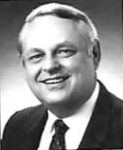John Nelson Darby. By Max S. Weremchuk. Neptune, NJ: Loizeaux Brothers, 1992. Translated from the German, John Nelson Darby and die Anfdnge einer Bewegung, 1988. 256 pp. Cloth, $14.99.
A strong GES supporter was challenged by an antidispensationalist about the father of modern dispensationalism: “He wasn’t very educated.” My friend, though a seminary graduate, had no answer. This book would have been a good reply.
After all, a man who studied at Westminster School, London (at the Abbey), where most of the teaching was in Greek and Latin; who as a teenager won the gold medal in [Greek and Latin] classics at Trinity University, Dublin; who spoke fluent French, German, Dutch, Italian, fair Spanish, and learned Maori in New Zealand in later years; who translated the Bible into three of these languages (also English!), with some help; who wrote 40 volumes of books, booklets, articles, hymns and poems, can scarcely be called “uneducated.”
John Nelson Darby (1800–1882), of an aristocratic Anglo—Irish family—there is even a family castle in Ireland-gave up all to follow Christ. This entailed 50 years of living out of a suitcase in much of Europe and in nearly all of the English-speaking world; founding dozens of congregations; pioneering the [re-]discovery of the pretribulation rapture, dispensational premillennialism, and the priesthood of believers. Since nearly all of these doctrines-not to mention the Free Grace position, which Darby also advocated-are under attack today, it is no wonder that Darby is widely maligned.
Though overly lauded by his devotees and overly lambasted by his detractors, Darby was, as nearly all admit, totally sold-out to Christ. He strongly influenced American evangelicalism, especially through Moody and Scofield.
This book is Teutonic in its thoroughness: It includes a family tree, original sources quoted at length, pictures, maps, Darby’s poems, Appendices A-L, extensive endnotes, bibliography, and acknowledgements.
Who should read this book? All those interested in the doctrines mentioned above, as well as people interested in the early Brethren Assemblies. F. F. Bruce, who represented those British brethren who rejected much of Darby’s theology, nevertheless called this book “a valuable study and certainly worthy of publication.”
For any readers from the Netherlands who may want a factual European approach to Darby and his views, this book is also available in Dutch.
Arthur L. Farstad
Editor
Journal of the Grace Evangelical Society
Dallas, TX

